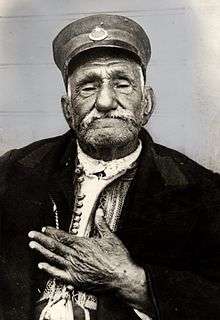Zaro Aga
| Zaro Aga | |
|---|---|
 | |
| Born |
c. 1777 Mutki, Ottoman Empire |
| Died |
29 June 1934 (aged 157) Istanbul Province, Turkey |
| Nationality | Turkish |
| Citizenship | Ottoman Empire, Turkey |
| Occupation | Porter, laborer, doorman |
| Known for | Longevity |
| Religion | Alevi Islam |
| Children | 13 |

.jpg)
Zaro Aga (Turkish: Zaro Ağa, Kurdish: Zaro Axa), claimed as 1774 or 1777; Mutki, Ottoman Empire - 29 June 1934;[1] Istanbul, Turkey, allegedly aged 157 when he died, is claimed to be one of the longest-living humans ever. Zaro Aga was of Kurdish origin.
There is a debate as to his actual age when he died. According to the death certificate given by his doctor, Zaro Aga's age was 157. He died in Istanbul, although there exists some confusion about the death place, probably because the body was sent to the US right after his death. However, research published by Walter Bowermann in 1939 indicated that Zaro Aga was only 97. If verified, this means he lived longer than Jeanne Calment, who lived to be 122 years and 64 days.
He was born in Medan village (present-day: Meydan ) in Mutki (Bitlis Province, Ottoman Empire), worked as a construction worker when he was young, and then moved to Istanbul, where he worked as a porter for more than 150 years and finally retired as a janitor. He was a major attraction to press during his last years as the world's oldest living man and one who had traveled to many countries, including the United States, the United Kingdom, France and Italy. His body was sent to the US for research purposes after he died.
Zaro Aga had come into Mustafa Kemal Atatürk's presence twice and called him "Sultan". When he met with Mustafa Kemal, he mentioned his having done very good jobs, but he criticized his giving much freedom to the women.[2]
| “ |
I know neither an unblessed called Sheikh Said, nor his men. God damn him. |
” |
References
- ↑ Mecid Efendi (one of the son-in-law of Zaro Aga), Cumhuriyet, July 1, 1934.
- ↑ http://arsiv.taraf.com.tr/yazilar/ayse-hur/modern-methuselah-zaro-aga/16715/
- ↑ Faik Bulut, Türk Basınında Kürtler, İstanbul, 1992, s. 80.
Further reading
- Rohat Alakom, Dünyanın En Yaşlı Adamı: Zaro Aga (1774-1934), Avesta, 2009.
- Rohat Alakom, Eski İstanbul Kürtleri (1453-1925), Avesta Yayınları, 1998; ISBN 975-7112-47-X, s. 155-161.